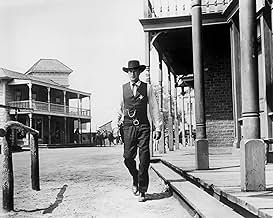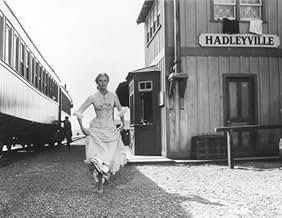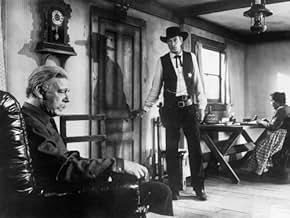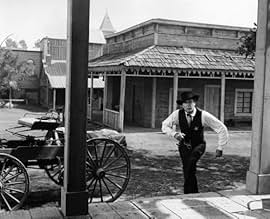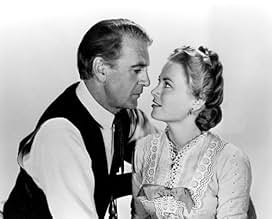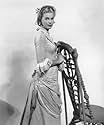A town Marshal, despite the disagreements of his newlywed bride and the townspeople around him, must face a gang of deadly killers alone at "high noon" when the gang leader, an outlaw he "se... Read allA town Marshal, despite the disagreements of his newlywed bride and the townspeople around him, must face a gang of deadly killers alone at "high noon" when the gang leader, an outlaw he "sent up" years ago, arrives on the noon train.A town Marshal, despite the disagreements of his newlywed bride and the townspeople around him, must face a gang of deadly killers alone at "high noon" when the gang leader, an outlaw he "sent up" years ago, arrives on the noon train.
- Director
- Writers
- Stars
- Won 4 Oscars
- 18 wins & 12 nominations total
- Martin Howe
- (as Lon Chaney)
- Sam Fuller
- (as Henry Morgan)
- Jim Pierce
- (as Robert Wilke)
- Townsman
- (uncredited)
- Church Member
- (uncredited)
- Director
- Writers
- All cast & crew
- Production, box office & more at IMDbPro
Featured reviews
Apparently, this film was intended as an allegory in Hollywood for the failure of Hollywood people to stand up to the House Un-American Activities Committee during the Sen. Joseph McCarthy Red-baiting era. John Wayne actually called the film "un-American", and was still trashing it twenty years later, which is pretty much the highest honor you can receive.
It must have also bothered Howard Hawks, because the "chicken" sheriff led Hawks to make "Rio Bravo", which, surprise, had John Wayne. As an interesting side note, Cooper was conservative, too, but I guess not as much as Wayne or at least not as emotional about it.
The film is called "a western for people who don't like westerns". I can see the point on that, but I do not know how accurate it is. I liked it, and I do not normally like westerns, so I probably should not argue. But I think some westerns are enjoyable by non-western fans, such as "Unforgiven". So "High Noon" is certainly not alone.
I love that the film is in "real time", that its running time is the same length as the actual plot. The only way this could have been better would be to do it with one, continuous shot. However, I suspect they did not have the technology for this, and it would ruin the cinematography. (Hitchkock basically did this with "Rope" with some key edits, but it is much easier when the film happens in a single room.)
Oh, and there is Lloyd Bridges, so young here...
Ably supported by Grace Kelly as his pacifist Quaker wife, who discovers love and right triumphs over long-held preconceptions; Katy Jurado as Kane's former mistress, a fiery Latino type; and Lloyd Bridges as the feisty deputy; Cooper runs away with the acting honours. The theme tune by Tex Ritter is also worthy of note.
High Noon' works because of its tightly written script, its cracking pace and crackling tension. I've seen the film many times and always see something different to notice and admire; still, I'd love to see it again for the first time and not know the twists and turns, not know how it ends. A fabulous film one of the best.
This is a film that packs a lot of symbolism because of the times when it was done. Those were the days of the communist hysteria where many people in the industry were accused, tried and lost jobs because when they faced the HUAC and Senator Joseph McCarthy.
Gary Cooper plays a man who is decent enough to return to the town where he just has gotten married and has finished his tour of duty. His conscience doesn't let him leave his post as he delays his plans and goes back to defend the town from the bandit who's been freed by Northern judges, and is coming back to seek revenge from Marshal Kane and the town.
Gary Cooper embodied the all Amercian hero. He was an actor who could do no wrong, as he proves in his take of Marshal Kane. We see him as the clock is ticking away toward noon time when the train will arrive in Hadleyville. We see him perspire as he goes around trying to get people help him deal with the problem, to no avail; he will have to do it himself. In the process, he clearly disappoints his new bride, who is horrified at the prospect of losing the man she clearly loves.
Grace Kelly was such an elegant figure that it's hard to imagine she would be in Hadleyville at all! Katy Jurado was also excellent as the jaded Helen Ramirez, the woman who owned a lot of businesses in town. Also effective, Thomas Mitchell, as the mayor of the town and Lloyd Bridges, as Harvey.
This is a film to treasure.
On his wedding day, dependable lawman Will Kane (Gary Cooper) has just handed in his badge and is preparing to leave town with his bride Amy (Grace Kelly) when he receives devastating news. An old adversary, Frank Miller (Ian MacDonald), has been pardoned for crimes that he should have hanged for and is on his way to Kane's town of Hadleyville to get revenge. He is due on the noon train, leaving Kane one hour to either run for his life or make preparations to fight. Kane and Amy set off at full gallop, hoping to put some miles between themselves and danger, but Kane doesn't get far before he feels compelled to turn back. With the new sheriff not due for a day, he just can't let go of the extraordinary sense of duty and responsibility he feels towards his town. However when he gets back to town he gets quite a shock - for no-one has the guts (nor, in some instances, the inclination) to fight alongside him against the Miller gang. As time ticks unstoppably towards noon, Kane gradually realises that if he's going to stop Miller and his boys, he's going to have to do it alone!
Cooper's performance is extremely powerful and he received a thoroughly deserved Oscar for it. Kelly is good as his bride, although many viewers will find her character hard to like. Lloyd Bridges has a brilliant early role as Kane's deputy, while the very best of the supporting pack is Katy Jurado as a Latino woman whose "history" with most of the men in town puts her in an unenviable position when the shooting starts. Fred Zinnemann directs the film outstandingly, making each scene fit into the grander scheme of things with literate precision. Any aspiring young film-maker wanting to learn how to pace a film correctly should watch High Noon with a close eye, for it is unparallelled as the most perfectly paced film of all-time. The music by Dmitri Tomkin - plus that incredible ballad "Do Not Forsake Me Oh My Darling" by Tex Ritter - is just one more element that makes High Noon one of the great masterpieces. There's nothing else to say - if you haven't already, go out and see this film NOW!
Did you know
- TriviaIn 1951, after 25 years in show business, Gary Cooper's professional reputation was in decline, and he was dropped from the "Motion Picture Herald's" list of the top-ten box-office performers. In the following year, he made a big comeback, at the age of 51, with this film.
- GoofsIn a number of scenes there are Pabst Brewing signs seen on the inside and outside walls of the saloon. Although Pabst did brew in 1848, it did so under the name Best and Company and did not change to Pabst until 1889; the 37-star flag suggests the setting dates are between 1867-77.
- Quotes
Helen Ramírez: You're a good-looking boy: you've big, broad shoulders. But he's a man. And it takes more than big, broad shoulders to make a man.
- ConnectionsEdited into Darkness at High Noon: The Carl Foreman Documents (2002)
- SoundtracksHigh Noon (Do Not Forsake Me, Oh My Darlin')
Music by Dimitri Tiomkin
Lyrics by Ned Washington
Performed by Tex Ritter
[Played over the opening title card and credits; excerpts played throughout the movie]
Details
Box office
- Budget
- $730,000 (estimated)
- Gross worldwide
- $217
- Runtime
- 1h 25m(85 min)
- Color
- Aspect ratio
- 1.37 : 1




